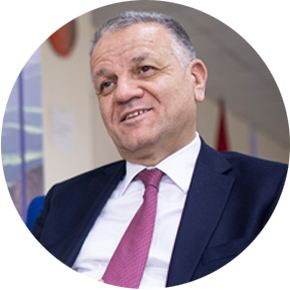Georgia’s talks with Gazprom on Russian gas purchase are underway. For this reason, some people call Georgian Minister of Energy Kakha Kaladze “a traitor” and Azerbaijani officials and MPs keep track of the talks with poorly disguised nervousness.
Mediamax asked Director of Armenian Center for Society Research Foundation Sevak Sarukhanyan to help analyze the nuances of Georgia-Russia talks and Armenia’s role in the process.
- Why did Georgia start paying attention to diversification of gas supplies? According to some commentaries, Georgia thus wants to be less dependent on Azerbaijan. How well-grounded are such opinions?
- Georgia’s aspirations to diversify supplies of natural gas are conditioned by a whole bunch of factors, and I underlined the major ones which are as follows:
1) delay of exploitation of Azerbaijani Shah-Deniz gas field;
2) growing consumption of natural gas in Georgia at the expense of new thermal power plants;
3) the price for Azerbaijani gas.
Tbilisi’s aspirations become quite clear after analyzing all these factor.
First of all, the structure of pricing of the gas imported to Georgia is linked to how well Azerbaijan will exploit Shah-Deniz gas field (first and second phases); the gas is exported through Baku-Tbilisi-Erzrum pipeline.
As a transit country for the Azerbaijani gas, Georgia under the relevant agreement with Baku is entitled to purchase 500mln cubic meters of Azerbaijani gas for USD64, 250mln cubic meters - for USD55; about 500mln cubic meters of the so-called “social gas” is supplied to Georgia for USD189, and the remaining portion is purchased at the market price of USD237.
However, the most profitable part of the contract with Azerbaijan is linked to the so-called “free gas”: 5% of the Azerbaijani gas transported through Baku-Tbilisi-Erzrum pipeline from Shah Deniz gas field should be left in Georgia’s territory.
It was calculated that in case of transportation of 30bln cubic meters of Azerbaijani natural gas to Georgia will be left free of charge as a transit payment - 600mln cubic meters which makes almost 1/4 of the current consumption rate in the country. It’s a weighty contribution to Georgia’s energy security and ensuring of low prices.
The implementation of this segment of the contract underwent major changes:
1) Shah-Deniz exploitation was delayed and it will be completed in 2022-2023 at best (because the oil price fall may affect the investment plans of both SOCAR and BP- the chief operator of the project);
2) the latest calculations indicate that Azerbaijan may at best transport 20bln cubic meters of gas through the pipeline which will reduce the Georgian share of free gas to 400mln cubic meters;
3) as of now, 6bln cubic meters of gas is exported through the pipeline which in this phase cuts off the Georgian share considerably and doesn’t benefit the country. That being said, the Georgian Oil and Gas Corporation spends almost the same amount for transiting the Azerbaijani gas as in case of possible export of 20bln or 30bln cubic meters. That means we see that Georgia hardly benefits from the most profitable component of the contract - the free gas supply.
As a result, we have definite pricing structure in Georgia:
- 500mln cubic meters for USD64
- 250mln cubic meters for USD55
- 500mln cubic meters of ''social gas'' for USD189
- about 700mln cubic meters for USD237
- about 200mln cubic meters for free as a payment for transit of Russian gas through Georgia's territory to Armenia.
Given Georgia's consumption of about 2.2bln cubic meters of natural gas, the country has to purchase up to 700mln cubic meters from Azerbaijan for USD237. It's a very high price taking into account the fact that 1000 cubic meters of Russian export gas will cost USD170-190 in 2016. That means if Azerbaijan doesn't decrease the market price for gas for Georgia it will be commercially more profitable to buy the Russian one.
- Is Azerbaijan really concerned about Georgia' steps or do Armenian media indulge in wishful thinking?
- Of course, there is a real worry, but it's not the matter of loss of Georgian gas market. If Georgia has a price alternative and new source of supply, it can change its positions on the transit pipeline. They will have a chance to demand more than agreement, as Azerbaijan delayed Shah-Deniz exploitation which Georgia had high hopes for.
Moreover, it's likely the structure of Azerbaijani gas consumption in Georgia won't grow; rather, it will stagnate. The thing is that Georgia is supplied with ''the social gas'' at the so-called discount rate of USD189- roughly speaking, it's the gas for population not for economy. Social gas consumption in Georgia almost reached a peak and the growth of consumption is provided at the expense of economy and thermal power plants in the first place. A new TPP is opened in Gardabani, other projects are being implementing which will cover the increase in consumption. The maths is quite simple here: if Azerbaijan bids gas for USD237 for the Gardabani TPP while Russia or Iran offer it for USD179, Georgia's choice is obvious. Thus, the gas consumption increase will be provided by non-Azerbaijani gas and Baku may become a supplier exclusively for ''the social gas''- which consumption won't considerably grow.
There is another point, too. Azerbaijani officials often say that the Georgian market is small hinting that losing it won't be a big issue. It's true but only in case Azerbaijan enters global markets.
And the entry is linked to the construction of TANAP pipeline in Turkey - the key link in the chain of the Azerbaijani gas export. The pipeline should be built at the expense of Azerbaijan and given the economic crisis and tangible reduction of the country's revenues due to oil price fall the country's financing of the project in the current phase may be dubious.
As a result, it may turn out that due to the lack of infrastructure capacities, the Azerbaijani gas may be ''locked'' in the region and loss of the Georgian market share in this case may be sensitive.
- Georgian Minister of Energy Kakha Kaladze said on January 11 that Georgia wanted to change the former agreements with Gazprom and get money for the transit of Russian gas to Armenia through its territory and not the 10% from the transmitted volume. What's the reason for Tbilisi's aspiration? Is it striving to get more cash due to economic crisis or are there any other factors?
- I think Georgia's aspiration is linked to the natural gas price fall. While calculating the transit cost through Georgia, Russia and Armenia relied on the Russian gas cost for Armenia. If the gas cost USD110 they thought Georgia ''took'' gas for USD11, if USD165- USD16.5. But it's a wrong approach. Calculations should be based on the international gas price: if Russian gas cost USD400 in Europe and USD165 for Armenia, Gazprom gave 10% from USD400 to Georgia - almost USD40 per 1000 cubic meters.
So, if Georgia wanted to purchase Russian gas 3 years ago, the price would be ''European'' not ''Armenian''.
It made ''the 10%'' mechanism very profitable for Tbilisi. But the gas price crashed and Georgia most probably conceded that if Gazprom would pay in an internationally recognized way - N dollars for 100km of transit road, Georgia would benefit more in terms of money than 10% from the overall volume. What formula will be offered for calculating the price for 100km of transit? That's the question.
- Commenting on Georgia-Iran-Russia talks upon our agency's request in early December, you said that Georgia would likely purchase ''virtual'' Iranian gas. That means Georgia will sign a contract with Iran on purchase of gas and will supply this ''Iranian gas'' from the Russian gas transported to Armenia. Instead, similar quantity of gas will be ''pumped'' by Iran from Iran-Armenia pipeline and the gas will be sold in Armenia as Russian. If the sides discuss such a deal, does it mean that nothing is changed for Armenia and we don't benefit anything?
- I think we will obviously benefit from the scheme. First of all, the load on Iran-Armenia pipeline will increase; the pipeline in various periods wasn't fully exploited or was operated only partially. We don't need such a ''half-alive'' infrastructure; amortization and other capital expenditures don't decrease due to minor load.
Secondly, Iran-Armenia ties will only deepen owing to the deal. It's critical given quite positive dynamics of Iran-Azerbaijan relations which Armenia tries to neglect- which is a very dangerous thing in my opinion.
Third, I want to digress from the energy topic: deepening of collaboration with Georgia is vital for us: we need more ties with the country and we need Tbilisi to be strongly interested in good relations with Yerevan.
Moreover, I think we should more integrate our energy sectors with Georgia, we should develop communications and create common markets - starting from tourism up to medicine market. I don't think Armenia's membership to EEU or Georgia-EU Association Agreement will hinder it.
- Does it mean Armenia is involved in the process as an active player and not an observer?
- Obviously, Armenia is an interested party which will only benefit from the scheme. As for the process, I think both Armenia and Iran are in a way observers as the main problem is whether two long-conflicting sides - Russia and Georgia- will be able to reach a mutually profitable agreement. If they manage, Armenia and Iran will only need to join the scheme.
- There are also opinions now that if Armenia ''didn't yield to Russia's pressure'' some time ago and Iran-Armenia gas pipeline had more transmission capacity, we would be able to discuss not virtual but real supplies of Iranian gas to Georgia. How would you comment on this?
- I've heard much about pressure on Yerevan but I haven't seen any documents or at least evidences of participants of talks yet.
Let's assume the alleged pressure didn't exist and we built a pipeline with higher transmission capacity. Given the fact that none of the global players - Iran, EU, Russia and U.S.- weren't ready to fund the construction of the segment on Armenia's territory, we would have to do it ourselves. We should have reached the pipeline to Armenia-Georgia border over 2006-2008 when Georgia didn't have any plans to purchase Iranian gas. Let's not forget that we're now talking about the possibility of Georgia's purchase of only several hundreds of millions of cubic meters of Iranian gas that would not economically justify the construction of a large pipe from Meghri to Kvemo-Kartli.
Naturally, the construction of the pipe would be justified in case of the Iranian gas transit through Armenia and Georgia to Europe. But the pipe at the diameter of 1.4 meters which we gave up using due to Russia's pressure (as is thought), could ensure transit of only 6-7bln cubic meters of natural gas. It's not a transit pipe to Europe. At best, we could refuse the Russian gas but that would mean that we chose another dependence on Iran instead of Russia.
And here I'd like to go back to the previous topic of our talk- Armenia-Georgia relations. Russia-Georgia-Armenia pipeline is still the main if not the only infrastructure which makes Georgia at least a bit dependant on Armenia. Refusing the pipeline would mean and means refusing the main infrastructure linking Georgia with Armenia.
- In your opinion, in conditions of eliminating or easing of sanctions against Iran, will the ideas on Iran-Georgia energy trade be realized through the territory of Armenia? Kakha Kaladze said in his last year's interview to our agency that ''the south direction of the transit corridor is very interesting and promising if relevant legal environment is established''.
- As far as I know the sides are already close to signing of the relevant agreement; Russia and EU are also interested in it. Since 2009, Armenia has actively lobbying the project and it is obviously in our interests as it expands the system of regional ties in energy sector with Armenia's involvement.
At the same time, the project will not tangibly influence Armenia's and Georgia's economies. As for the expansion of ties between Georgia and Iran, one shouldn't expect serious shifts after elimination of sanctions as the parties don't have any pending projects besides energy ones. The countries may unite in a single transport unit within Silk Road Economic Belt Chinese project but the prospect doesn't belong to near future.
Ara Tadevosyan talked to Sevak Sarukhanyan


























Comments
Dear visitors, You can place your opinion on the material using your Facebook account. Please, be polite and follow our simple rules: you are not allowed to make off - topic comments, place advertisements, use abusive and filthy language. The editorial staff reserves the right to moderate and delete comments in case of breach of the rules.